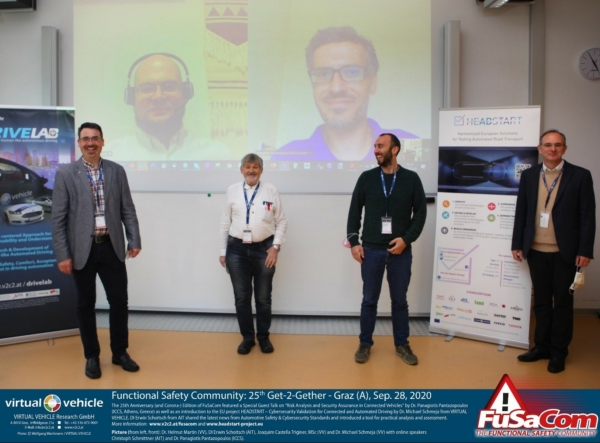
On September 28, the Austrian Functional Safety Community (FuSaCom) invited members of the HEADSTART project to participate in the 25th Get-2-Gether Workshop in Graz, Austria. FuSaCom brings together experts from industry and research dealing with the functional safety with the purpose to build a larger network and getting to know the partners in the field of functional safety. Furthermore, FuSaCom promotes the cooperation between industry and research and supports the various partners in terms of interpreting standards for functional safety with a special focus on cross-domain exchange of experience (automotive, rail, aviation, industrial sectors).
Given the special restrictions during the ongoing Covid-19 pandemic, the workshop was promoted and held as a first-time hybrid event, i.e. with limited physical presence and online via MS Teams platform.
The general objective of the workshop was to provide a platform for management and technical discussions on:
- Functional Safety;
- Cybersecurity Engineering;
- Safety of the Intended Functionality (SOTIF).
The participants were given an overview of the HEADSTART project including an insight into the HEADSTART methodology, procedure, and cybersecurity specific activities. Furthermore, an update on automotive safety and cybersecurity standards was given by Erwin Schoitsch and Christoph Schmittner from AIT. Moreover, participants were able to gain an insight into cybersecurity-related approaches in the context of two EU research projects (i.e., H2020 DS SAFERtec and CEF Telecom 2CeVau project) presented by Panagiotis Pantazopoulos.The full agenda of the workshop is available here.
The workshop included the following presentations:
- Risk Analysis and Security Assurance in Connected Vehicles;
- Introduction to the HEADSTART project;
- HEADSTART methodology, procedure and cybersecurity specific activities;
- Latest News from Automotive Safety and Cybersecurity Standards;
- Tools for practical analysis and assessment
The workshop was recorded. The recordings are available here.
Due to the applicable Covid-19 restrictions on travel, gatherings and public events, the workshop was organised as a hybrid event meaning that participants were not only able to partake F2F as usual but also to participate virtually. Even though the hybrid format meant that networking possibilities were slightly reduced in comparison to traditional F2F events, the workshop still turned out to be a success.
Fruitful bilateral discussions on the latest trends in standardisation took place in the course of the event, which can be taken into consideration with regards to future project work as well as the research outcomes from AIT. Such inputs from AIT presenters were extremely important to keep HEADSTART in state of art regarding cybersecurity within the automotive domain. Another relevant input was the ongoing standardization activities within the SECREDAS project, strongly connected with safety, security and privacy co-engineering that could support cybersecurity procedure activities of HEADSTART. The HEADSTART project was presented to a field of cybersecurity experts and interesting and engaging talks on the project itself were held after the workshop with the F2F audience. Having experts in the field of cybersecurity and actively participating in standardization committees was a special value. Such experts expressed their interest in HEADSTART procedure, especially cybersecurity and its particular procedure for safety validation of CAD vehicles. The FuSaCom provided a great networking platform for discussions on cybersecurity-related topics within the project and continues to do so in the future.
